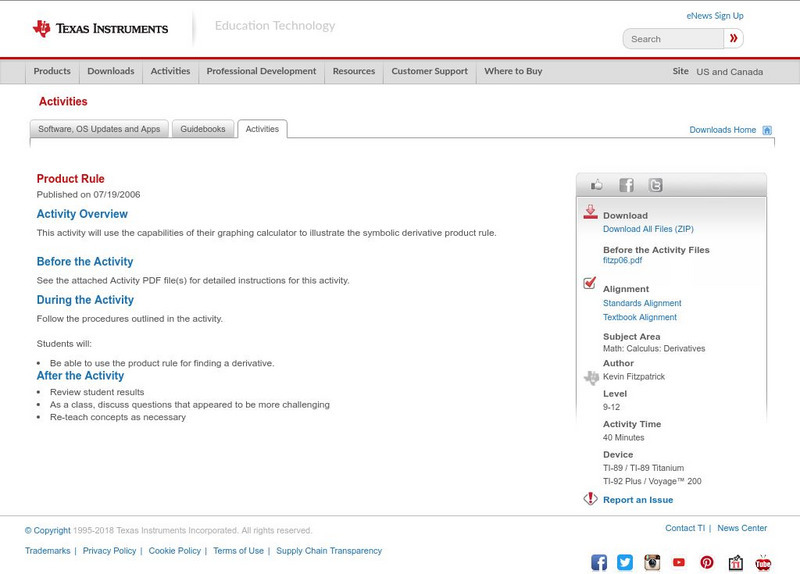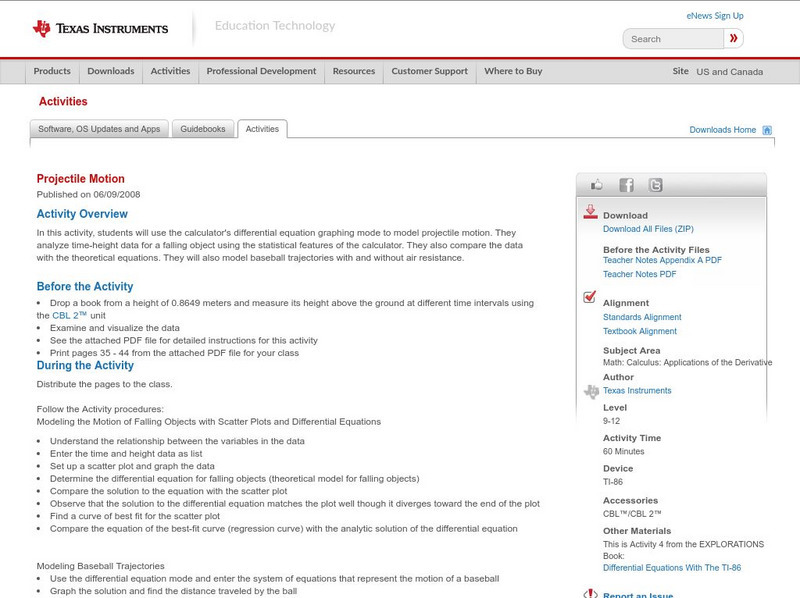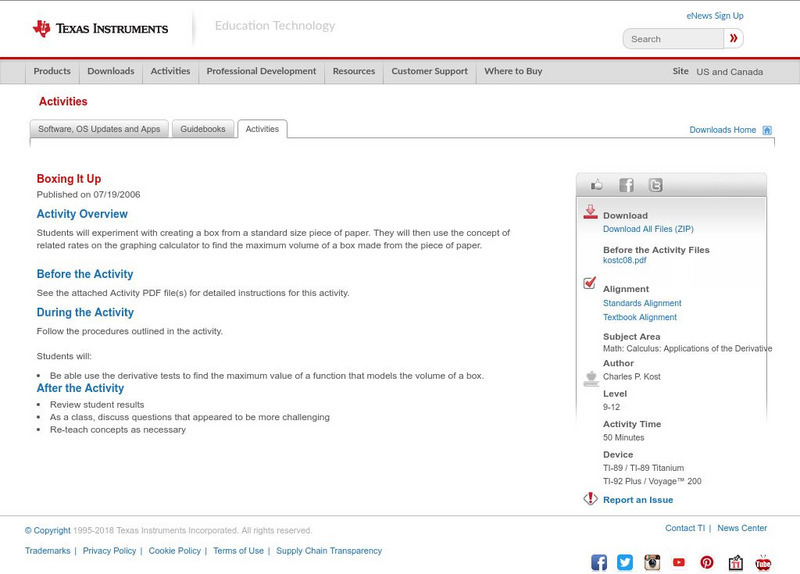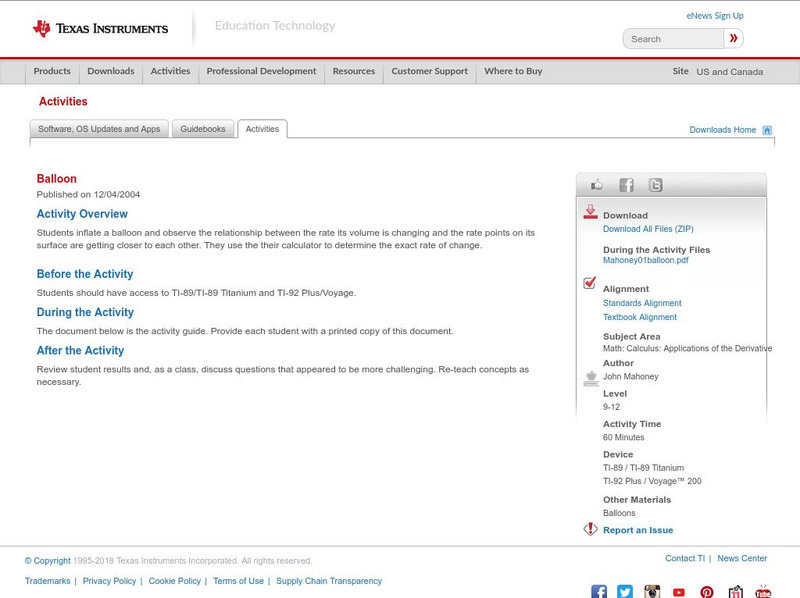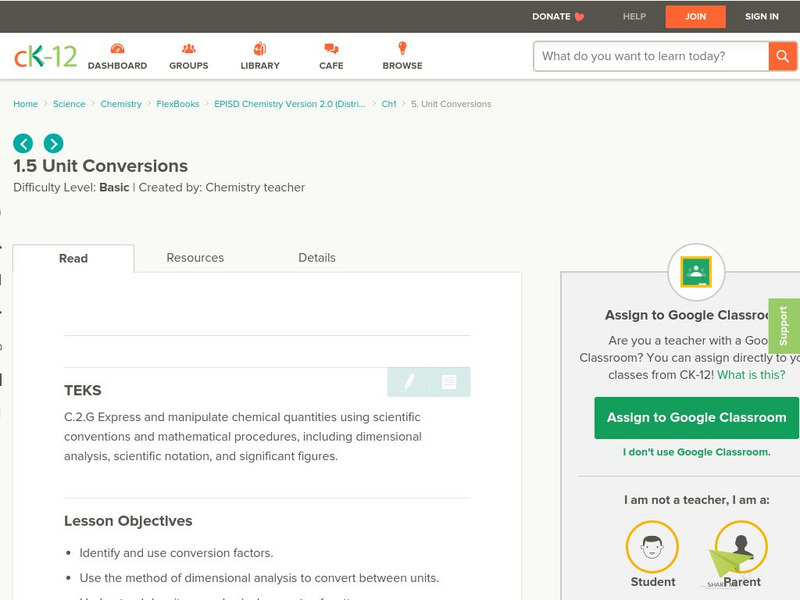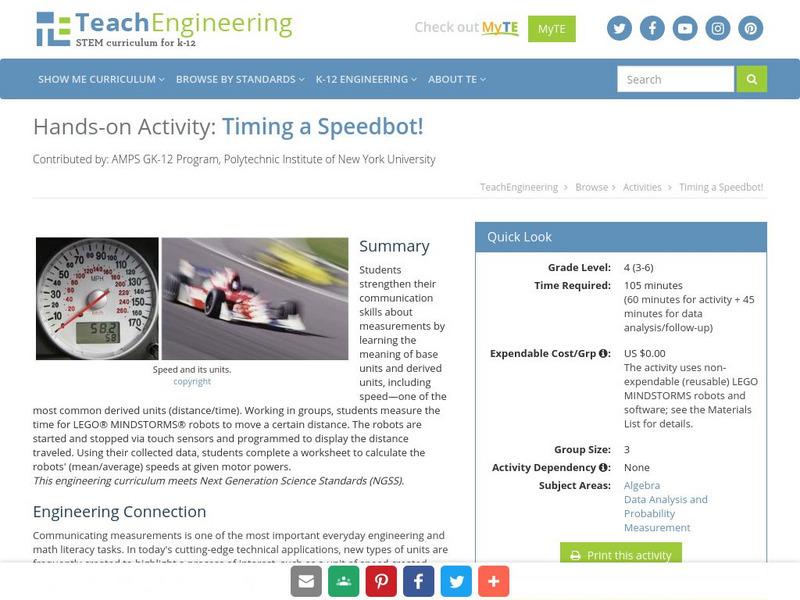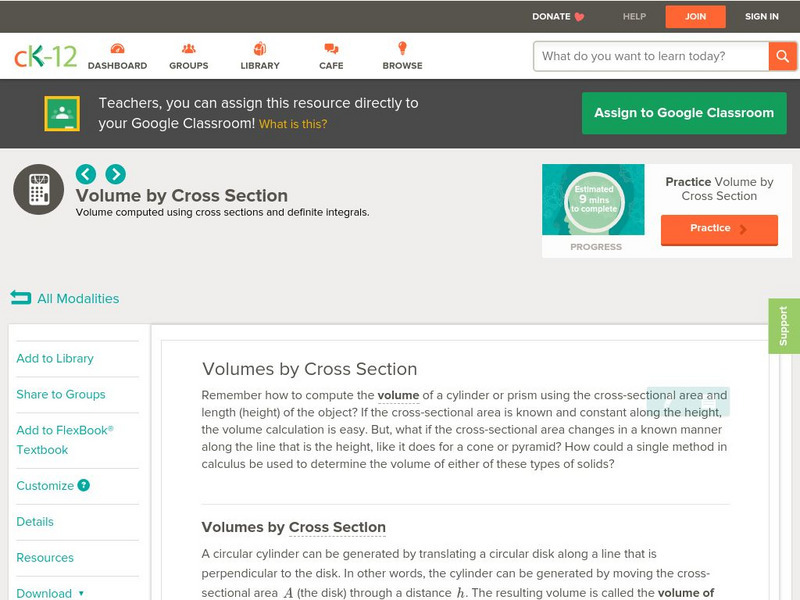Ministry of Education and Universities of the Region of Murcia (Spain)
Ministerio De Educacion Y Ciencia: Derivadas Laterales
This interactive unit is intended to show by graphing and calculations, the elements involved in the study of the growth of a functions and its relation to the definition of derivative.
Texas Instruments
Texas Instruments: Features of the Ti 89 That Maximize Its Use
This Computer Algebra System (CAS) activity encourages students to investigate the various functions and applications of the CAS calculator. They study and practice various types of problems in algebra and calculus with the help of the...
Alabama Learning Exchange
Alex: Liquidity for Success
This lesson will input values to calculate financial ratios and intepret the information derived from the calculations. This is a Commerce and Information Technology lesson plan.
Texas Instruments
Texas Instruments: General Quadratics, Cubics, and Quartics
This activity explores the characteristics of the graphs of quadratic, cubic, and quartic functions. The graphing calculator will be used to generate graphs and derivatives of these functions.
Texas Instruments
Texas Instruments: Product Rule
This activity will use the capabilities of their graphing calculator to illustrate the symbolic derivative product rule.
Texas Instruments
Texas Instruments: Projectile Motion
In this activity, students can use the calculator's differential equation graphing mode to model projectile motion. They analyze time-height data for a falling object using the statistical features of the calculator. They also compare...
Texas Instruments
Texas Instruments: Boxing It Up
In this activity, students will experiment with creating a box from a standard size piece of paper. They will then use the concept of related rates on the graphing calculator to find the maximum volume of a box made from the piece of paper.
Texas Instruments
Texas Instruments: Higher Order Differential Equations
In this activity, students use the calculator to graph the solution to a second-order and third-order differential equations. They convert higher order differential equations by substitution to a system of first order differential...
Texas Instruments
Texas Instruments: Hot Tub
This activity is an application of integration. Students first use the calculator to determine specific numeric results to enable them to understand the dynamics of the problem. (Continued. See "before the activity.")
Texas Instruments
Texas Instruments: Balloon
Students inflate a balloon and observe the relationship between the rate its volume is changing and the rate points on its surface are getting closer to each other. They use the their calculator to determine the exact rate of change.
Other
Rev. Ken Collins: The Season of Easter
This site discusses the Easter season and details how it is celebrated by Christians worldwide. It includes information on the biblical account of the first Easter, derivation of the word "easter," and a method to determine the day on...
Illustrative Mathematics
Illustrative Mathematics: G C Mutually Tangent Circles
Three circles are mutually tangent. Students are asked to find the total area of the circles plus the area inside where they meet. Students will need to know how to calculate the area of a circle, a sector of a circle, and an equilateral...
Texas Instruments
Texas Instruments: Quotient Rule
This activity will use the capabilities of the graphing calculator to illustrate the symbolic derivative quotient rule.
Texas Instruments
Texas Instruments: Implicit Differentiation
In this activity, students can use the graphing calculator to find the derivative of an implicitly defined function.
Texas Instruments
Texas Instruments: Implicit Differentiation on the Ti 89
This activity demonstrates implicit differentiation on the graphing calculator.
Ministry of Education and Universities of the Region of Murcia (Spain)
Ministerio De Educacion Y Ciencia: Aplicaciones De La Derivada
In Spanish. In this interactive unit learn how to calculate intervals of growth and decay, maximum and minimum value of a function, the intervals of concavity and convexity and the turning points of a function.
ClassFlow
Class Flow: Rapid Division
[Free Registration/Login Required] The following pages of this lesson provide opportunities for using division facts related to times tables to make calculations and to quickly derive division facts corresponding to multiplication tables...
CK-12 Foundation
Ck 12: Analysis: Cross Products
[Free Registration/Login may be required to access all resource tools.] In this lessons students will be defining and calculating cross products and normal vectors. Students examine guided notes, review guided practice, watch...
PBS
Pbs: Jazz and Math: Improvisation Permutations
This lesson deals primarily with the number of rhythmic combinations that can be found in a four beat measure of music. Students will learn through trial and error and derive a mathematical formula to calculate the number of possible...
CK-12 Foundation
Ck 12: Unit Conversions
[Free Registration/Login may be required to access all resource tools.] In this online tutorial students will begin to identify and use conversion factors and to also use the method of dimensional analysis to convert between units....
OpenStax
Open Stax: College Physics: Bernoulli's Equation
Learn all about Bernoulli's principle in this section. Explore the definition, how to calculate, how to derive, and applications of Bernoulli's equation. Section also includes problems and questions for the students to answer to ensure...
OpenStax
Open Stax: Time, Velocity and Speed
In the following interactive module, students will begin to explain the relationships between instantaneous velocity, average velocity, instantaneous speed, average speed, displacement, and time. They will calculate velocity and speed...
TeachEngineering
Teach Engineering: Timing a Speedbot!
Students strengthen their communication skills by first learning the meaning of base units and derived units. Then, working in groups, students measure the time for LEGO MINDSTORMS NXT robots and calculate the robots' average speeds at...
CK-12 Foundation
Ck 12: Calculus: Volume by Cross Section
[Free Registration/Login may be required to access all resource tools.] This tutorial explains how to calculate the volume of various solids using the 'slicing' method and then deriving a formula for each solid. It goes on to discuss...




